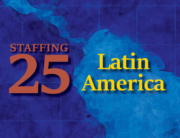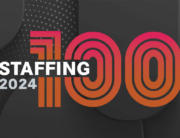Each day, a new challenge arrives at the doorsteps of staffing companies as they consciously work to respond to, and get ahead of, broader market trends, client expectations and financial pressures from all sides. With all these competing demands, it can be difficult to keep up with the ever-complex legal landscape. Staffing companies routinely ask: What are the greatest threats to our business model? Here are five prominent issues that can become significant headaches for staffing companies.
Each day, a new challenge arrives at the doorsteps of staffing companies as they consciously work to respond to, and get ahead of, broader market trends, client expectations and financial pressures from all sides. With all these competing demands, it can be difficult to keep up with the ever-complex legal landscape. Staffing companies routinely ask: What are the greatest threats to our business model? Here are five prominent issues that can become significant headaches for staffing companies.
1. The ACA’s Foggy Legal Landscape
One of the most significant regulatory requirements to come out of the Patient Protection and Affordable Care Act (ACA) are the IRS’ new Forms 1094 and 1095. These forms are the main vehicles by which insurers (self-insured employers will use Forms 1094-B and 1095-B) and employers (who will use Forms 1094-C and 1095-C) will report their offers of health coverage and employee enrollment in health coverage.
While it’s voluntary this year, as of 2016, the new reporting requirements will take significant attention by staffing companies because compliance will require the collection and verification of numerous employee and health plan details, including, but not limited to, full-time employee counts for each month; the Social Security number/date-of-birth of each covered individual (including non-employee dependents who are enrolled in the employer’s health plan); and a determination of whether “minimum essential coverage” was offered to qualifying employees for each month of the calendar year. Staffing companies should begin analyzing these forms now and assess whether the appropriate internal reporting mechanisms are in place before the reporting deadline arrives. In many cases, the sheer complexity associated with compliance will require consultation with outside counsel.
2. Wage-and-Hour
Last year, individuals filed more than 8,000 lawsuits against employers, alleging violations of the Fair Labor Standards Act. Notwithstanding the fact this figure does not account for the numerous state law-based wage-and-hour lawsuits filed last year, it nonetheless provides staffing companies with a sobering statistic that should all but secure the place of wage-and-hour issues in each staffing company’s list of top-five legal concerns.
One recurring wage-and-hour headache for staffing companies is the issue of incorrect classifications of exempt and nonexempt employees. For example, if the staffing company considers an employee to be exempt, what proof can it point to should the employee turn around and claim he or she was actually nonexempt and thus due additional wages, such as overtime pay? Just as one should not judge a book by its cover, one should not rely on the employee’s job description to determine whether he or she is an exempt employee. Proper classification of exempt employees depends on facts associated with the employee’s actual work and day-to-day responsibilities, not on labels. Staffing companies employing exempt individuals should remain vigilant and ensure that employees they consider to be exempt are actually exempt under the law.
Another common wage-and-hour problem for staffing companies involves the tracking — and enforcement — of non-exempt employees’ hours. Underreporting, misreporting and employer failures to monitor nonexempt worker hours represent three of the most prevalent issues in wage-and-hour lawsuits. Because employees of staffing companies often work in client workspaces and facilities, monitoring and enforcing accurate time reporting is an especially delicate and complex affair for many staffing companies. Nonetheless, staffing companies should ensure both clients and nonexempt employees accurately report their time and do not exceed previously agreed-upon work hours.
3. Don’t Get Iced
Independent contractor (IC) classification is a stalwart issue that routinely haunts even the most exacting of firms. Staffing companies that act as “matchmakers” between clients and ICs (who are often specialists in their respective fields) can find themselves in precarious legal situations if they do not carefully craft IC arrangements to ensure compliance with the litany of applicable state and federal laws.
One of the easiest methods to combat allegations of improper IC classification is to follow the nation’s strictest employee classification test: the ABC Test, which holds a strong (but rebuttable) presumption against finding individuals to be independent contractors. Regardless of the strategy a staffing company employs, the cornerstone behind every IC classification defense is a showing that company practice followed policy.
4. Indemnification Incapacitation
Indemnification agreements between staffing companies and their clients are popular contracts that often shield the client from any legal consequences that flow from the actions of the staffing company’s employees while they are at work for the client. However, staffing companies should be wary of entering into indemnification agreements that cover situations or circumstances that are simply out of their control, or agreements that are clearly one-sided and expose the staffing company to significant legal and financial liability.
From the staffing supplier’s perspective, some of the most dangerous, and often struck-down, agreements include provisions that indemnify a client for events caused by the client’s own negligence, provisions that indemnify a client for its own intentional acts (such as theft or illegal sexual conduct by the client’s employee), and provisions that are clearly the product of disparate negotiating positions.
If precisely drafted and attuned to each agreement’s circumstances, indemnification agreements can be powerful — and helpful — tools that can help clearly demarcate the boundaries of a staffing company’s legal liability. In contrast, imprecise, sloppy and unfairly lopsided agreements can present significant liabilities to staffing companies.
5. Cyber Attacks
As computers and electronic devices continue to take over the processing, storage and dissemination of information, staffing companies need to be on a constant lookout for cyber vulnerabilities and attacks. Because the nature of staffing work often brings about the collection and storage of troves of client, employee and IC data into one single location (the staffing company), staffing companies are attractive targets to cyber criminals and opportunists.
In addition to this inherent challenge, staffing companies must also face the reality that workplace functions are increasingly becoming mobile as more and more employees perform work duties on their personal mobile devices and off-site interfaces. To combat the perpetual threat of cyber attacks in a dynamically changing workplace, staffing companies should habitually review, revise and ready their data protection plans and practices to keep up with the latest security trends and to stem the latest flood of cyber attacks.







